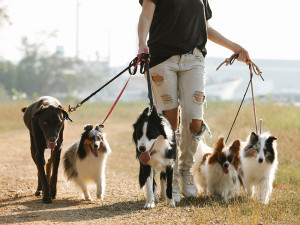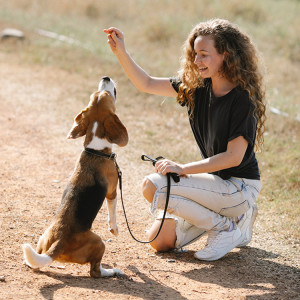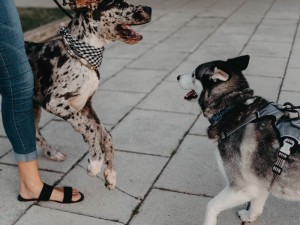Are You to Blame for Your Dog’s Behavioral Issues?
You may have wondered if you're the one causing the problem.

Share Article
People receive so much criticism when their dogs have behavioral issues, and it makes many folks feel terrible — guilty and humiliated and flawed and inadequate. If a dog is acting out, especially if they are aggressive, a lot of shame can come with that. But there's enough going on in the world today messing with our mental health, let's not let our dog's training get us down, OK?
It's a huge misconception that a dog’s behavior reflects back on their people, and if everyone would just train their dog properly, they would be absolutely lovely in all situations. To this, I am torn between saying, “If only!” and explaining why these ideas are unfair and untrue.
I would like to put to rest those judgements that are causing so many people to suffer unnecessarily. There are some very common reasons dogs have behavioral challenges that aren’t about their pet parent. The main reasons dogs have behavioral issues are genetics, trauma, inadequate socialization (COVID wasn’t your fault, was it?!), medical issues, and individuality.

Get (totally free) deals for food, treats, accessories, tech, and way more pet parenting must-haves.
opens in a new tabYes, we can work with our dogs to improve their behavior, and yes, poorly-trained dogs deserve our best training and efforts going forward. Training certainly makes a difference and can help make dogs more polite and more fun to live with, but if people try to tell you that you are the reason your dog has a serious behavioral issue, please know that they are almost certainly wrong.
Here are the usual suspects.
Genetics
Genes influence behavior. That’s why many dogs act in a similar way to their parents, whether that means being really interested in fetching, having high energy, or being friendly and into snuggles. Genes also play a role in less desirable behavior such as being fearful of strangers or loud noises, lacking impulse control, and a tendency to overeat. Although the environment in which they are raised has a powerful influence over how dogs develop, their genes guide that development and have a powerful effect on who a dog becomes.
Some dogs have a natural inclination to be patient, to be able to spend time alone without stressing, or to handle fireworks, and it’s easy to develop these qualities in such dogs with minimal effort. For other dogs, these challenges represent a lifelong struggle even with highly skilled training and management. Genes don’t predetermine dog’s behavior, but they are important, influencing the likelihood of developing behavioral issues, despite a lot of variation based on their experiences in life.
Traumatic experiences
Trauma can cause dogs to be afraid, and fear so often causes serious behavioral challenges. A majority of dogs who are aggressive toward strangers (people) and to dogs (unfamiliar ones, especially) are acting in this undesirable way because they are scared. If a dog has such a bad experience that they associate people or dogs with pain or being frightened, acting appropriately around them will be a challenge, and such dogs need help to meet this challenge.
Sometimes, the trauma is a long period of abuse, and sometimes it’s a single distressing experience. Dogs may become afraid of dogs if they are playing with a dog while they sustain an injury. They may develop a fear of people if they are with a new person when a terrifying storm passes over without warning.
Missed socialization
An insufficient amount of socialization can have a huge impact on a dog’s behavior throughout their life. Socialization aims to expose a puppy to a variety of new experiences during a critical period of their lives, ranging from three weeks of age to about 14 weeks old. Many people welcome a dog into their life when they are already past the age of socialization, and others were unaware of what to do and how to do it in order to socialize their dogs properly.
Those of us in the field of dog training and behavior, as well as other dog-related careers, need to do a better job with education to make sure more people socialize their dogs in the appropriate time frame. That said so many dogs were pandemic puppies and as a society, we were collectively unable to give many dogs the socialization they needed at that time.
Medical issues
No matter how much we try to take care of a dog’s health, medical issues can arise that profoundly impact our dog’s behavior. Whether it’s epilepsy, a thyroid problem, a tumor, an injury, an infection, a broken tooth causing pain, hearing or vision loss, there are a large number of medical situations that can lead to various behavioral changes.
Undesirable behavior due to medical causes can include: acting aggressively, becoming withdrawn or irritable, decreased responsiveness to cues, house soiling in a fully housetrained dog, and discomfort with being left alone, confined to a space, or handled and petted.
Individuality
Dogs are each unique, and for a variety of reasons, some dogs are more prone to behavioral challenges than others. Dogs vary greatly in their self-control, frustration tolerance, impulse control, agreeableness, emotional control, general sociability, playfulness, etc. Really, what this means is that each dog is a unique being with their own personality. They each have their own distinct neurology. We can influence dogs’ behavior to some degree, but that doesn’t mean we can change the essence of who they are.
Repeat it again: not your fault
Despite what some people may assume, pet parents are not always responsible for their dogs' behavioral issues. Remember that tons of people, even with minimal effort towards training, have dogs who don’t have serious behavioral issues. Are they really better than you? No! (But their luck may be.)

Karen B. London, PhD, CAAB, CPDT-KA
Karen B. London, Ph.D., is a Certified Applied Animal Behaviorist and Certified Professional Dog Trainer who specializes in working with dogs with serious behavioral issues, including aggression, and has also trained other animals including cats, birds, snakes, and insects. She writes the animal column for the Arizona Daily Sun and is an Adjunct Professor in the Department of Biological Sciences at Northern Arizona University. She is the author of six books about training and behavior, including her most recent, Treat Everyone Like a Dog: How a Dog Trainer’s World View Can Improve Your Lifeopens in a new tab.
Related articles
![two small puppies play on a beach]()
Here’s Why You Need to Socialize Your Dog ASAP
Waiting until full vaccination to socialize can cause huge problems for your pup.
![A woman walking 5 dogs on leashes outside.]() opens in a new tab
opens in a new tabBreed Does Not Equal Behavior—Here’s Why
A new study found that a dog’s breed accounts for less than 10 percent of their behavior.
![Female dog trainer raising a treat above a beagle dog's head]() opens in a new tab
opens in a new tabYour Dog’s Trauma Triggers Are Everywhere. Fear-Free Training Can Help
“America’s Veterinarian” and the founder of Fear Free Pets, Dr. Marty Becker, on how this method makes vet visits, training sessions, and grooming appointments less stressful for pets.
![A woman sitting on a couch with a dog.]() opens in a new tab
opens in a new tabDoes Your Pet Need Therapy?
Dogs and cats can’t read self-help books, so a veterinary behaviorist explains how your pet may benefit from being in treatment.
![Great Dane puppy and Husky meeting on leash out side.]() opens in a new tab
opens in a new tabUnderstanding Reactivity and Aggression in Dogs: Two Very Different Things
Turns out, even experts have a hard time defining these terms.







